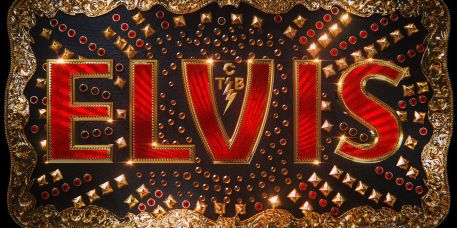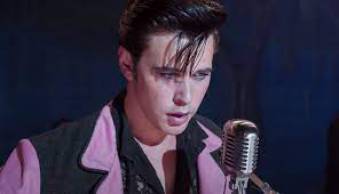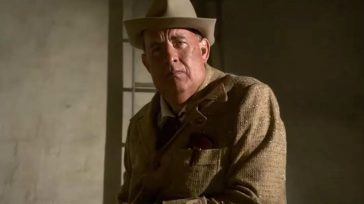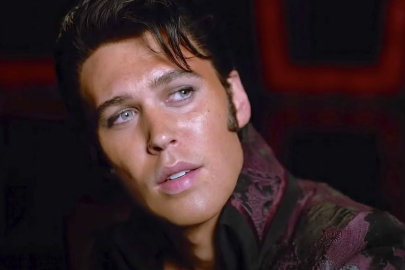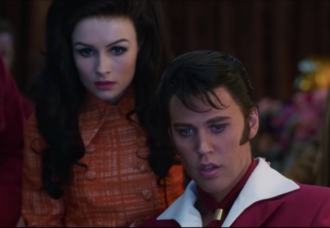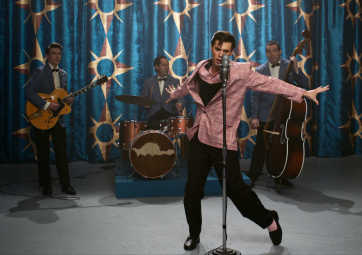Memories of June 26th 1977
A Word from Strictly Elvis' David Wade
Today is the Anniversary of Elvis’ last ever Concert and it is particularly poignant given that I and a group of 250 (mostly from the UK but with smaller groups from Holland, Belgium, Denmark, Norway and France) had attended that very concert. Needless it was an occasion I will never forget. Elvis’ voice was magnificent and he was so obviously giving it his all but he looked ill – very jaundiced and sweating profusely...more so than I’d ever seen before. As we returned to the hotel the coach was hushed – everyone deep in their own thoughts. Whilst we didn’t (and couldn’t) know how ill he was we all knew that ‘our man’ was in trouble, and it affected us all. You could have heard a pin drop on the coach that evening.
Unlucky to have been witness to Elvis’ illness or lucky (honoured even) to have been present at that last ever concert? I think the latter. In fact I cannot believe how lucky I am to have seen Elvis perform so many times when that would have been the ultimate dream for so many people...and it’s when I talk to fans that I took out to the States in those lovely, lucky, early days that I really appreciate just how fortunate we all were.
Perhaps it was that, more than anything, that cemented the foundation for where we are today – one big ‘Strictly Elvis’ family, where we can enjoy get-togethers such as the Collectors Fair yesterday, the activities of the many independent fan clubs throughout the country (or indeed the world as we are even more ‘International’ now than we’ve ever been) as well as the tours, celebrations and events organised by Strictly Elvis UK and the Elvis Travel Service. People regularly ask me when I’m going to retire (am I looking old or something?) and I have one stock answer....”If you had the best job in the world – would you give it up?”
SEEING ELVIS IN CONCERT
By David Hawthorne
It’s hard to believe that it’s over 40 years since I first visited America to see Elvis in concert.
It was June 1977, at Gatwick Airport, and around 250 Elvis fans had gathered in the departure lounge. When it came to boarding the aircraft, we all had to pass between the legs of a large 20 foot high cut out of Elvis, which was placed at the foot of the steps leading to the plane. The image was of Elvis singing ‘Teddy Bear’ from the movie ‘Loving You’. Security at airports have certainly changed since then.
We landed in Chicago, and no expense was spared as David Wade and his travel company had booked us into the Chicago Hilton. This hotel has featured in a number of blockbuster films, and is remembered for the climactic ending in Harrison Ford’s ‘The Fugitive’.
On June 25th we all headed to Cincinnati to see Elvis perform at the Riverfront Coliseum. On the way we stopped at our hotel, where we were greeted by Col. Tom Parker who handed out Elvis Summer Festival polystyrene boater hats to everyone. These were the same as those on sale in Las Vegas.
That night we boarded our coaches to take us to the show. I remember going into the venue and I thought I would ask the attendant if I could keep the ticket as a souvenir, but I was too late, he had already torn it in half, well at least I still have the ticket stub. Soon I made my way to my seat and was amazed to discover I was only 12 rows from the front of the stage.
The hawkers were everywhere, walking up and down the aisles selling Elvis merchandise. The Colonel was doing his job. There was posters, programmes , badges and photos. I bought a programme and a badge. I also managed to obtain an advanced copy of the Moody Blue album , which was pressed in blue vinyl. This album was not due for release until July. In fact Elvis mentioned it at the concert.
Soon the lights dimmed and the strains of the 2001 theme echoed around the arena. This was it, and I realised that in a few moments I was going to see my idol in person.
Suddenly Elvis appeared at the side of the stage. He had a big grin on his face as he nodded and waved to the audience , as he walked from one side of the stage to the other.
Elvis looked splendid in his Mexican Sundial jumpsuit. He apologised for being late and said he had to visit the dentist.
As for the concert itself, what can I say….magical, unbelievable, fantastic…here I was seeing my idol in person. The man whose records I had collected and whose films I had watched in my local cinema since I was a boy.
There’s really no need for me to go into the songs, we all know the routine by now. ‘CC Rider/Amen’ etc.
But one song that stands out for me was ‘Unchained Melody’. It was an unusual song for Elvis and it had not yet been officially released. Elvis went to the back of the stage and sat at a piano to perform it. As I was seated near the stage I could not see him. So I sat in silence, like everyone else in the audience and listened to his voice. A voice that was as strong and as velvet sounding as ever.
One other incident that I recall was making eye contact with Elvis. Now whether Elvis actually spotted me is doubtful, but as I was photographing him I could see into his eyes and it made my heart skip a beat. I know that sounds fanciful, but it did happen and I can’t even imagine what it must have been like to actually meet the man.
Alas, the concert came to an end all too soon. As the intro to ‘Can’t Help Falling in Love’ sounded the audience collectively sighed, everyone knew it was the end of the show.
Soon we all left the building and headed back to our hotel, knowing we would see The King the following evening.
So, on Sunday 26 June 1977, we headed to the Market Square Arena in Indianapolis. Here we were greeted by the CBS film crew who had already recorded two earlier Elvis performances for their forthcoming TV special ‘Elvis in Concert’. They filmed us and interviewed some fans. (I would like to add here that Elvis did not look in as bad a condition as he appeared in that TV special. He had lost some weight in the two weeks since those concerts were filmed, and although he was overweight his voice remained as good as ever and he was more focused and every bit the ultimate showman).
Again I took my seat, which was situated up on the stand to the right of the stage. From here I could see back stage and saw Elvis as he approached the steps to climb up on to the stage. He was wearing the same Mexican Sundial suit and I remember feeling disappointed, as I would have prefered to have seen him in a different outfit.
Again he waved and shook hands with some fans, before putting on his guitar and diving straight into ‘CC Rider’/Amen’, and the end of the song Elvis takes of his guitar and tosses it into the air behind him, where Charlie Hodge duly catches it amid cheers form the audience.
The screams continued and the flash bulbs popped. Yes it was take 2 and Elvis was doing what he does best. Highlights were ‘You Gave Me a Mountain’, ‘Release Me’, ‘Bridge Over Troubled Water’, ‘Hurt’, and ‘I Really Don’t Want to Know’.
After the band introductions, Elvis brought his father on stage, saying he’d been sick for a while. Vernon, dressed in a blue jacket and looking rather frail put his arm around Elvis and waived to the audience. Elvis also introduced his ‘new girlfriend’ Ginger who stood up and waved.
I have to say this show was better than the previous night’s performance. Elvis seemed to have more energy and was in good form, joking and interacting with the audience, perhaps Elvis went that extra mile as he knew this was the end of the tour. At the closing of the concert, before singing ‘Can’t Help Falling in Love’, Elvis stated “this is the last day of our tour, but if you want us back, call us and we’ll be back. Adios”.
Little did we know this would be his last live appearance. From where I was seated I could see Elvis leave the stage, Joe Esposito put his arm around Elvis and guided him off the stage and down the steps to an awaiting limo. Elvis was about to leave the building for the last time.
The Elvis Movie
ELVIS - A Film by Baz Luhrmann
(Warner Bros. 2022)
A Review by Gerry McLafferty
President: Elvis Presley Film Society
Email - elvispresley.filmsociety@ntlworld.com
Facebook - Elvis Presley: The Film Society
Spoiler alert: There are spoilers here, if you have not viewed the film as yet. Just to inform you.
Was there an underhand strategy to Colonel Tom Parker taking on Elvis Presley exclusively - a one client / one promoter arrangement? That is the basis of the movie, as explored by Baz Luhrmann, where almost immediate narration by Parker (as played and voiced by Tom Hanks) leads us into the history of this, oftentimes, uncomfortable and complex relationship.
We are aware that the narration is pointedly directed to the theatre audience, for maximum effect and reaction. From the jazzy opening sequence taking in Las Vegas highlights we are on a cinematic journey of the highs, lows and very dark moments in the unique pairing that was Elvis and the Colonel. Could one have survived and progressed without the other? That’s a question that has been asked so many times over the years, the real answer to which is clearly difficult to truly ascertain.
A significant part of the story is seen in several references to Parker’s ‘Snowmen’s League of America’ - a somewhat mythical ‘organisation’ where Parker indulged his con-man antics on those bewildered individuals who thought they were part of some worthwhile unit. Parker’s early beginnings as an entrepreneur take us to a nervous Elvis appearing on the Louisiana Hayride in 1955. Footage of Elvis’s boyhood influences, including at revival meetings, works very well in establishing the type of music he was witness to and how it was to affect his own choices in music direction. The recreation of 1950’s Beale Street is quite an incredible feat, giving the audience a real taste of the amazing world Elvis was to immerse himself in. It seemed so entirely appropriate to feature black artists such as B.B. King, Little Richard, Arthur Crudup and Sister Rosetta Stone as a prominent part of Elvis’s incredible story. The relationship of Elvis with his mother, Gladys, is given a lot of focus – almost to be expected, given the depth of this subject in numerous books and in lesser film biopics. Losing his mother when he was just twenty-three years old obviously had a profound effect on Elvis and it is documented very emotionally in this telling of the tragic event. Early concerts on the road with Scotty and Bill provide a definite excitement in examining these seminal times in Elvis’s life. His eventual surpassing of Hank Snow as headliner on Snow’s tours is well handled, and demonstrates very pointedly his burgeoning rise to fame and music notoriety.
Moving from Sun Records to RCA was the catalyst to Elvis’s stratospheric rise to national, and subsequent, worldwide recognition as a truly gifted musician and entertainer. The signing, as depicted in the movie, is of course wholly engineered by Parker and even at this early stage in his career, somehow smacks of manipulation. Gladys’ reluctance to sign the document is spot-on to real events. She stated clearly that she mistrusted the Colonel in his dealings. The movie very much reflects that judgement. It almost becomes even clearer in the scene with the I Love Elvis and I Hate Elvis badges. Merchandising an individual to extensive lengths seemed to begin with Elvis and it never stopped during his lifetime, nor indeed beyond. Recreations of Elvis’s appearances on both the Milton Berle Show and the Steve Allen Show are handled very well, with Austin Butler giving an amazing physical account of Elvis’s on-stage movements. Compelling stuff indeed. The Russwood Park concert sequence, where we see authorities filming Elvis’s movements for any signs of lewdness, is done very well, building in expectation of just what he is going to say, and more importantly, what he is going to do.
This is a key moment in the story’s structure. The army days and his return to the U.S. and Hollywood is dealt with briefly. The scene where Austin Butler is cut into the actual footage from Live a Little, Love a Little and the A Little Less Conversation song is extremely well done. As we move to the 1968 NBC Special this, appropriately, is dealt with quite extensively. All the ballyhoo about the Colonel insisting on a Christmas-themed show is present. There’s a lot of license taken over the actual events and the then time-line, but it serves the dramatic storytelling for this particular avenue of biographical presentation. As in real life, the reaction to Elvis’s return to roots, as it were, with the TV Special, was seen as a monumental moment in his career. It is made clear that he could only go up from this point.
The recreation of several segments from the Special is extremely well done, and appears immaculate in detail. Elvis’s return to the concert stage in 1969 in Las Vegas is done with great gusto, and of course serious fans will immediately notice it is based on his actual August 1970 third season at the International Hotel. By that time there was more flamboyance in the entire set, including with Elvis’s outfits, unlike his summer 1969 return which was more sedate in its setting.
Again, for the purposes of storytelling, it works very well. That’s a great piece of cinematic drama showing the Colonel setting up a 5-year contract with the Hotel owner, and detailing it all on a tablecloth. That event is of course wholly accurate and is one of the most incredible ‘contracts’ ever struck in show business.
From the amazingly successful return to live performing, we see something of a decline in Elvis’s enthusiasm as he is thwarted at every turn in his desire to perform in other countries. A look at the Colonel’s mysterious background blends with his consistent, yet always explained, refusal to arrange such tours for Elvis. His insistence that American shores provide enough scope for their needs seemed to speak to Elvis – however reluctant he may have been initially. The on-stage tirade where Elvis fires the Colonel was of course entirely fabricated, but he did fire him after a Las Vegas show in 1973 – only to take him back after several days when Vernon Presley convinced him that they would owe him too much money. This outcome was depicted in the film. This event has always posed that huge question – would Elvis’s career have gone a completely different route if he had stuck to his original decision and sacked the Colonel for good? We’ll never know. The film does not greatly focus on Elvis’s physical decline really until the final poignant scenes where Austin Butler performs Unchained Melody on the piano, and the footage segues into the actual June 1977 CBS film of Elvis himself. Beautifully done, highly emotional and very unexpected. Continuing with film of Elvis through the years seems the perfect finale, and an on-screen coda explaining Parker’s questionable financial dealings and subsequent legal battles and dismissal from Elvis Presley Enterprises tells us a clear, and very sad, part of the fascinating story of ‘Two odd lonely children’ - to quote Tom Hanks as Parker.
So, to the makers and performers of Elvis. Director Baz Luhrmann has quite a pedigree of movies, such as Romeo + Juliet; Moulin Rouge! and The Great Gatsby among others to his credit. He co-wrote the script for Elvis and very much immersed himself in the entire production – seeking out every bit of relevant information he could find on his subject, and all with the approval of EPE of course. Tom Hanks portrays Tom Parker with a mischievous flair, capturing recognisable elements of the man. From a personal viewpoint, I have no idea why he chose such a strange accent. I don’t feel that worked at all. Yes, we know Parker arrived from Holland around 1930 or so, but all through his time as Elvis’s manager he spoke with an American accent. This will remain a puzzler.
Austin Butler has received nothing but praise from reviewers and justifiably so. He worked for two solid years doing nothing but familiarising himself with everything Elvis. As a result, he truly encapsulates the spirit of Elvis in such a compelling manner. In terms of his physical interpretation he was outstanding, channelling Elvis’s movements, his mannerisms and stage routines in a very precise manner. He may very well be the recipient of several awards down the line for his incredible performance, and if so, they will be very much justified. As for the music, well quite a portion is by Elvis himself of course; some vocals by Austin Butler and there is a hybrid of both vocals also heard on the soundtrack. The choice of songs works well and must surely provide non-fans (cinemagoers) with a great cross-section of Elvis’s music. This is, after all, the story of an exceptionally gifted artist, driven by an equally exceptional love of music in many forms.
Overall, this is an amazing film; a positive portrait of Elvis Presley – the man and the artist. It is lively, it is sad and emotional and is a telling account of how one man’s dreams can be reached, even surpassed, and then somehow taken away. Forget the inaccuracies – we know Elvis didn’t have Graceland in 1956; he didn’t have the Lisa Marie plane until 1975; he didn’t ever perform in Las Vegas for six-week stints; the International Hotel changed to the Las Vegas Hilton in 1971 etc. etc. That isn’t important. These facts are altered for dramatic reconstruction to ensure more consistent framing of events. What matters is the reaction to the production as a storytelling event. In that area, it all works perfectly.
Contact information: elvispresley.filmsociety@ntlworld.com



